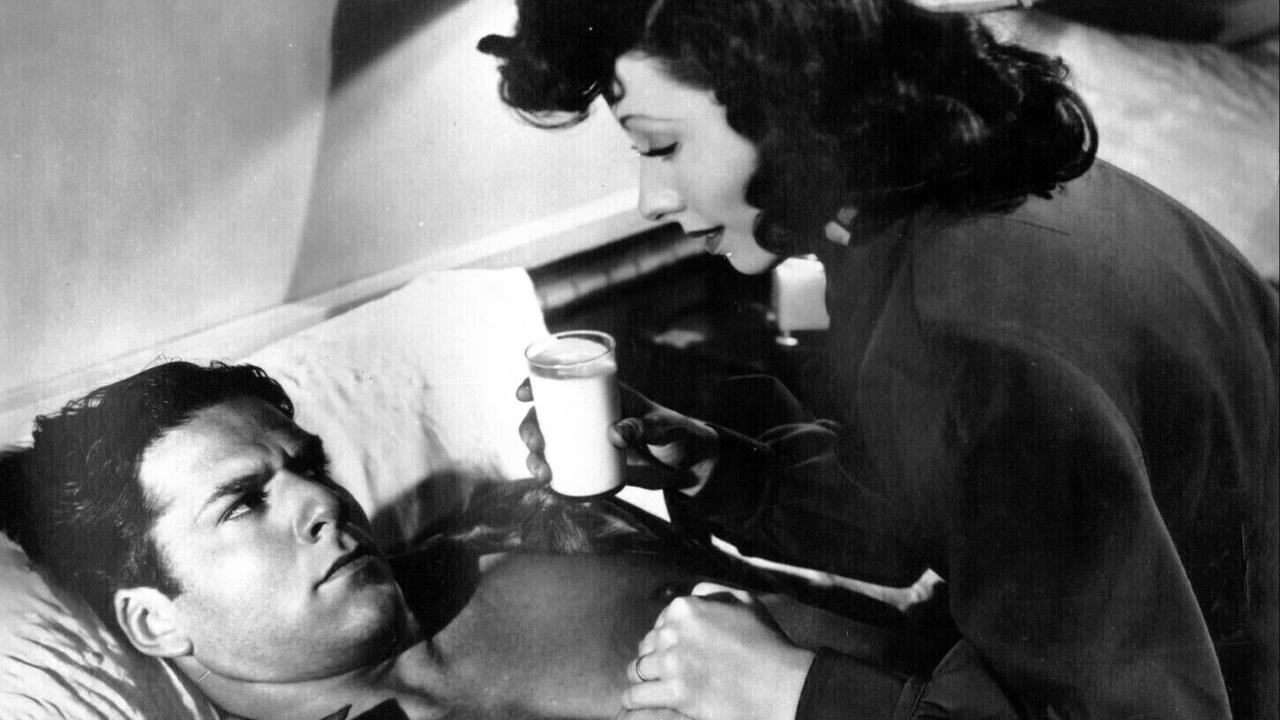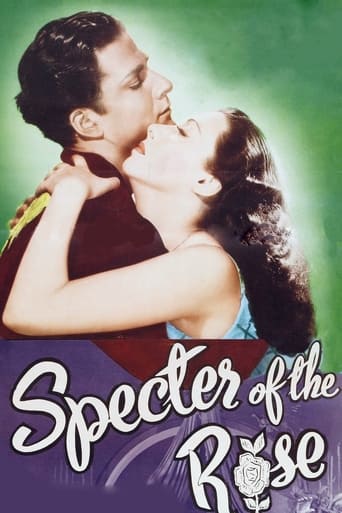BILLYBOY-10
Judith Anderson who was the nasty, evil Danvers in Rebecca and the miscast "big mama" with a British-Louisiana accent in Cat on a Hot Tin Roof plays a former ballerina who runs a ballet school (don't they all?). Lionel Sandler who became the gruff major domo in the TV series Hart to Hart, plays a gruff non-rhyming poet. Some other guy, plays an over the top effectual show biz promoter. This other guy decides to resurrect the career of a the brilliant ballet dancer Ivor Somebody,who may or may not have killed his wife a few months early and since then he has become a looney toon recluse;he hears music in his head and sees ghost dancers with his face. Anywho, he says he is OK now and begins a series of road shows and has a hot love and marriage to another dancer, I forget her name..she made two movies in her entire career...twice as many as Ivor. Well, as luck would have it, sometime after Kansas City, Ivor sort of starts going cuckoo again. Lots of drama and jumping and twirling which is suppose to resemble ballet ensues and instead of slitting his wife's throat he takes a flying leap out the plate glass window. Kerplunk. Some silly dialog for a couple of minutes. And then the movie ends. I streamed this on Netflix but the won't give me a pro-rated credit. The acting is dreadful. The dancing by Ivor is gymnastics, not ballet. The whole thing is awful.
Terrell-4
This movie, as self-conscious as it is in telling a tale of art and madness, is no work by Hollywood hacks. Unfortunately, it's even worse; it's the work of probably Hollywood's greatest screenwriter, Ben Hecht. He was at the height of his fame and clout, so he received the go-head to write, direct and produce what must have been a project close to his heart. It goes to show, once again, that even the greatest creative types need an editor, or at least a friend they respect who'll tell them when something isn't working. The Specter of the Rose tells the story of Andre Sanine (Ivan Kirov), a great ballet dancer who is suspected of killing his wife in a period of madness, while they were dancing Le Spectre de la Rose. For weeks afterwards he simply lay in bed, unable to dance, unresponsive to all those in the world of ballet who see him as a genius. They include Madame la Sylph (Judith Anderson), once a great ballet artist herself who now runs an impoverished ballet school but who maintains the highest standards, and Max Polikoff (Michael Chekhov), an eternally optimistic and unreliable impresario, and as hard up for funds as is Madame la Sylph. Lurking about is a critic, poet and writer, Lionel Gans (Lionel Stander), who cynically comments on what he sees, usually in epigrams. When Sanine meets a young ballerina, Haidi (Viola Essen), he recovers. He has a renewed passion for dancing. He and Haidi fall in love and marry. Polikoff cobbles together enough funds to mount a production of Le Spectre. Madame la Sylph supervises the production, but with misgivings. And Sanine and Haidi will dance together...the story of a young woman who returns from her first ball joyous and clutching a red rose. She falls asleep and the rose comes to life as a lover. They dance, and as he fades away, she dies with a smile of love and longing on her lips. Will history repeat itself with Sanine and his new wife? Somewhere between the opening message, "Here's to the seven arts, that dance and sing, And keep our hearts, green with spring," and the last message spoken by Gans, "Out of our endless tears, we make our own little songs and dances," one assumes is the place Hecht wanted for this movie. That he fails, in my opinion, doesn't make the film so much a failure as a gallant but misguided attempt. It seems to me that Hecht had the bones of an engrossing story, but he was felled by the excesses of his own script and by the problem he created for himself of having to find two dancers who could dance their roles credibly while being good enough actors not to compromise the story. He only managed to find two dancers. The acting by Kirov and Essen, combined with the self-consciousness of the script, is frustrating. Lionel Gans, with his epigrams and over-written posturing, is used by Hecht as a kind of on-screen commentator. He is just irritating. For instance, early in the movie Gans comes to Madame la Sylph's ballet studio with a police detective investigating the death of Sanine's first wife. Polikoff introduces himself to the detective. Gans speaks up with world weary cynicism, "A wilted carnation," he describes Polikoff, "in the Broadway buttonhole. This is Madame la Sylph, the remains of a pirouette. And this is the sad little factory where dancing toys are made." Yet it seems Gans has been carrying a torch for Haidi. When he criticizes Sanine she turns on him. "Oh, you're a monster! I loath you! I just loath you!" she says and begins to cry. Gans looks at her for a moment and says quietly, "I didn't think you could cry. I often cry, at night. Then I think of you and I become full of young words all dancing for you, and then I pretend I'm not a monster. And on this delusion I live until morning." Ben Hecht or not, this sort of writing is awful. Or this exchange between Sanine and Haidi. They are sitting together at a small table. "Hug me with your eyes," he asks her. "I am," she says. "Harder," he replies. What happened to the skillful Ben Hecht of His Girl Friday, Notorious, Nothing Sacred and Wuthering Heights? With the exception of Judith Anderson, who turns in a highly professional job, the other actors are either exaggerations or dull. Michael Chekhov, with a hairdo that looks like it was created for one of the Munchkins, plays an aging, effeminate, eye-rolling, overly-dramatic character who outclasses even Clifton Webb. Lionel Stander, with that tough looking mug and rough voice, seems almost willfully miscast. He's interesting at first, but then the character, a one-note portrayal, becomes tiresome. The two leads both seem to be professional and competent dancers. Kirov, especially, is called upon to do impressive leaps. Neither can act well. Kirov, for modern audiences, looks uncomfortably like a young Leslie Nielson. Hecht, for all this, makes the movie an amusing look at all it takes to make something creative happen, from musicians' unions, agents, society backers and billing lines. The movie also has a fine musical score by George Antheil. Although he paid the bills by writing for movies, Antheil was a widely respected composer of symphonies, chamber works, sonatas and ballets. The music he wrote for the Specter of the Rose ballet in the film features an intriguing and angular waltz that most decidedly doesn't make you think of turn-of-the- century Vienna. As the creation of a hugely gifted writer and outstanding screen-writing craftsman (just check all the movies Hecht was called on to fix without taking credit), The Specter of the Rose is worth watching and even buying. But it is a curiosity piece, an intriguing failure.
guil fisher
This seldom seen film produced, written and directed by Ben Hecht, brings some terrific dancing, namely from the two leads, Ivan Kirov [with a gorgeous physique, and doing fantastic leaps and bounds] and Viola Essen [another fine ballet dancer]whom I had the pleasure of auditioning with back in the 50s for "Dead End" [roles of Baby Face Martin and his ex-girl friend Francie] we didn't get cast, unfortunately. They bring some wonderful moments of dance in spite of a somewhat hard to believe plot and corny lines. Appearing as La Sylph, who sits around knitting, while the dancers go through their paces is none other than Dame Judith Anderson, the queen of film noir [such as "Laura"]. She does manage to keep herself out of the mire of this melodramatic piece with her presence. Add to this another great actor, Michael Chekhov, from Russia's Stanislavski Moscow Theatre, giving a silly performance of a foppish manager of the dance troupe. He did more realistic acting in the such of "Spellbound" and "Rhapsody". Hard to believe from this performance he was the great acting teacher of the time along with Sanford Meisner. Then there's comedian Lionel Stander being realistic as a sort of serious suitor to our leading lady. The choreography was done by none other than Tamara Geva, once married to George Balanchine, and star of Broadway's "On Your Toes" starring Ray Bolger where she initiated the "Slaughter On Seventh Avenue" ballet. [Later brought to film by Gene Kelly and Vera Ellen in "Words & Music"] In spite of a twisted plot and sketchy dialogue, you become fascinated with this gem of a movie. Watching the lovers dance is worth the price of admission.

